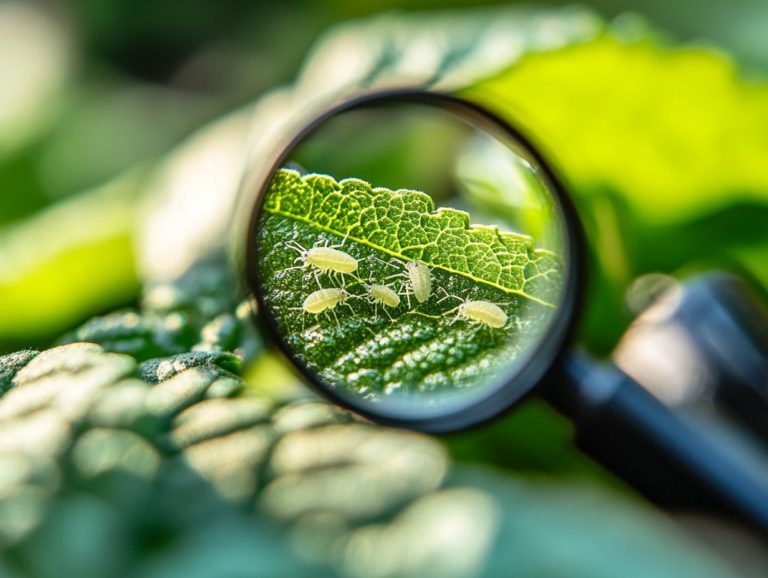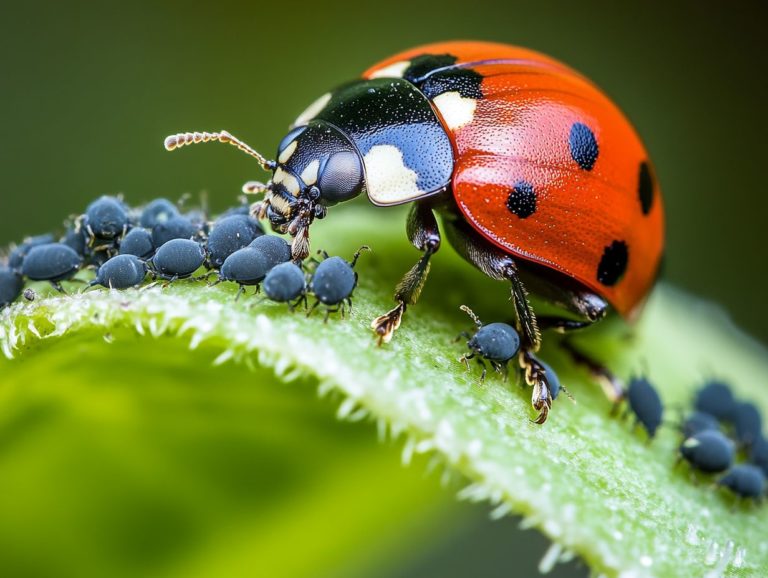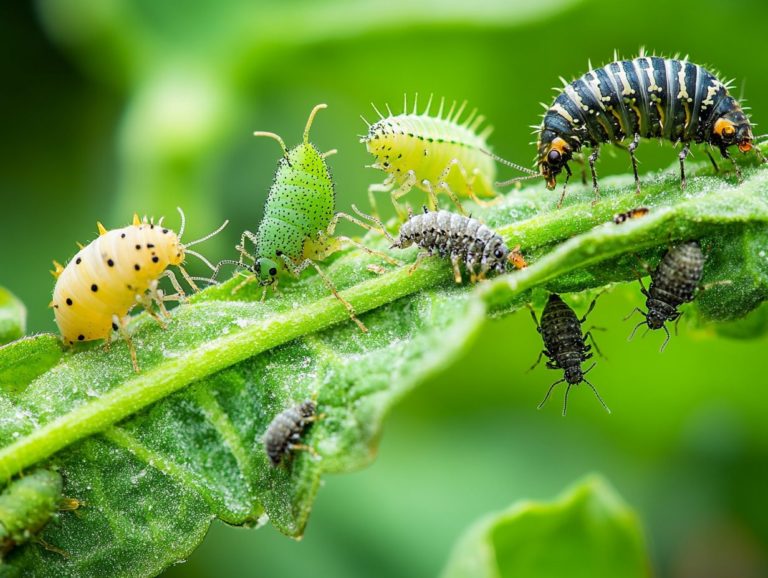Using Essential Oils to Deter Pests
Contents
- Natural Pest Control: Your Essential Oil Guide!
- Key Takeaways:
- Top Essential Oils to Keep Pests Away
- How to Use Essential Oils for Pest Control
- Safety Considerations when Using Essential Oils for Pest Control
- Frequently Asked Questions
- Discover How Essential Oils Can Deter Pests!
- Which essential oils are most effective in deterring pests?
- How do I use essential oils to deter pests?
- Are essential oils safe to use around children and pets?
- How often do I need to reapply essential oils to deter pests?
- Can essential oils completely eliminate pests?
Natural Pest Control: Your Essential Oil Guide!
Are you fed up with those annoying pests invading your home? Essential oils could be the natural solution you’ve been searching for, offering a simple way to combat summer pests!
These powerful plant extracts not only elevate your mood with their delightful fragrances but also serve as effective deterrents against unwanted insects, acting as natural insect repellents.
This article delves into what essential oils are, the benefits of using them for pest control, and which oils are most effective against common intruders like ants, mosquitoes, flies, and spiders, including popular essential oils like lavender and peppermint.
Get ready to uncover simple DIY recipes and essential safety tips to create a pest-free haven. Transform your home into a sanctuary!
Key Takeaways:
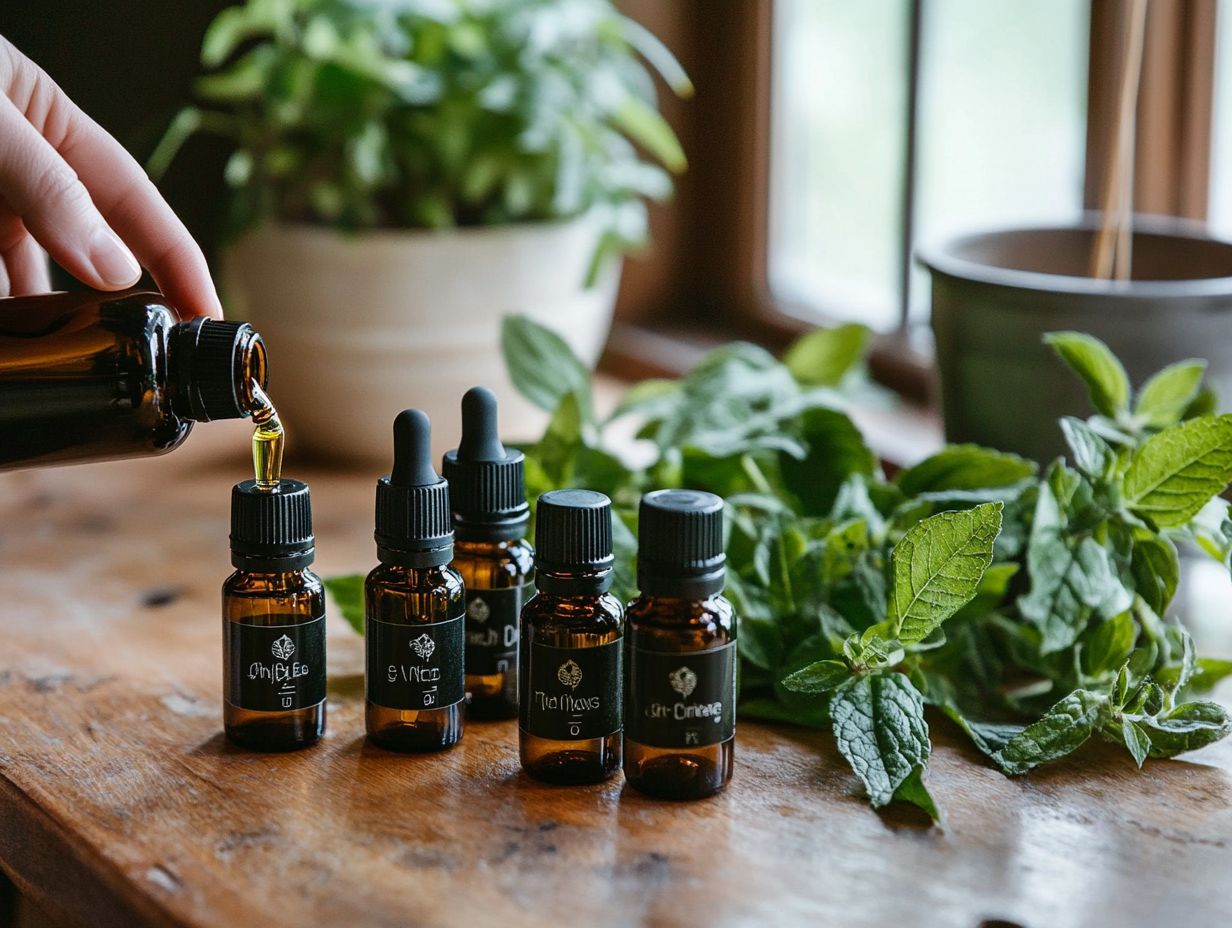
Essential oils are a natural and effective way to repel pests without using harsh chemicals.
Common pests like ants, mosquitoes, flies, and spiders can be repelled using specific essential oils like peppermint, citronella, lemongrass, and lavender.
DIY recipes and proper application methods are key to successfully using essential oils for pest control. Always consider safety precautions and possible risks when using these oils.
What are Essential Oils?
Essential oils are concentrated extracts from various parts of plants like flowers, leaves, stems, and roots that capture the plant’s unique aroma and beneficial properties, including names like eucalyptus globulus and peppermint.
You can obtain these oils through several methods, such as steam distillation, which involves using steam to extract the oils, cold pressing, and solvent extraction, all of which preserve the plant s fragrance and therapeutic qualities, making them great for aromatherapy.
Often used in aromatherapy, essential oils like lavender are prized for their ability to promote relaxation and alleviate stress, making them highly sought after in wellness circles.
Eucalyptus oil, with its invigorating scent, is particularly renowned for its respiratory benefits, helping to clear airways and reduce congestion.
But the versatility of these aromatic extracts doesn t stop there. They also find their way into natural cleaning products, diffusers, and even DIY insect repellents, showcasing their multifaceted role in enhancing both physical and emotional well-being.
Benefits of Using Essential Oils for Pest Control
Using essential oils as a natural insect repellent offers a wealth of benefits compared to conventional chemical cleaners. These botanical extracts not only keep pesky pests like mosquitoes at bay but also serve as an eco-friendly alternative, steering clear of harmful chemicals and promoting a healthier living environment.
With the natural ability to kill or repel insects from oils such as peppermint and lavender, you can ensure that your home remains a sanctuary during summer evenings, free from bug bites and skin irritation, especially against mosquitoes.
These powerful essential oils can easily be incorporated into your DIY recipes for homemade insect repellents and cleaning products.
Not only do these oils fend off pests, but they also improve your emotional well-being, as many of them boast calming scents that can alleviate stress and anxiety, often categorized as mood-boosting oils.
For instance, eucalyptus oil not only works wonders against spiders and other unwelcome guests but also promotes easier breathing and a sense of relaxation, making it a key ingredient in many natural recipes.
Oils like tea tree and lemon are celebrated for their antibacterial properties, making them excellent choices for your green cleaning solutions, providing an eco-friendly alternative to chemical cleaners.
By embracing these natural alternatives, you can protect your home from pests while enriching your surroundings with a refreshing, fragrant ambiance.
Top Essential Oils to Keep Pests Away
Understanding common pests and the most effective essential oils to deter them is vital for crafting a successful pest control strategy. Pests like mosquitoes, ants, flies, and spiders can invade your home and garden, leading to discomfort and potential damage, especially during the summer.
Fortunately, various essential oils have powerful insect-repelling abilities that can naturally repel these unwelcome guests. For example, citronella oil is renowned for its effectiveness against mosquitoes. Meanwhile, peppermint essential oil is excellent at keeping ants and spiders away, making it a popular choice for natural insect repellent sprays.
By using natural recipes and insect repellent sprays with these essential oils, you can protect your environment without relying on harmful chemical insecticides. This way, you choose plant-based repellents instead.
Ants
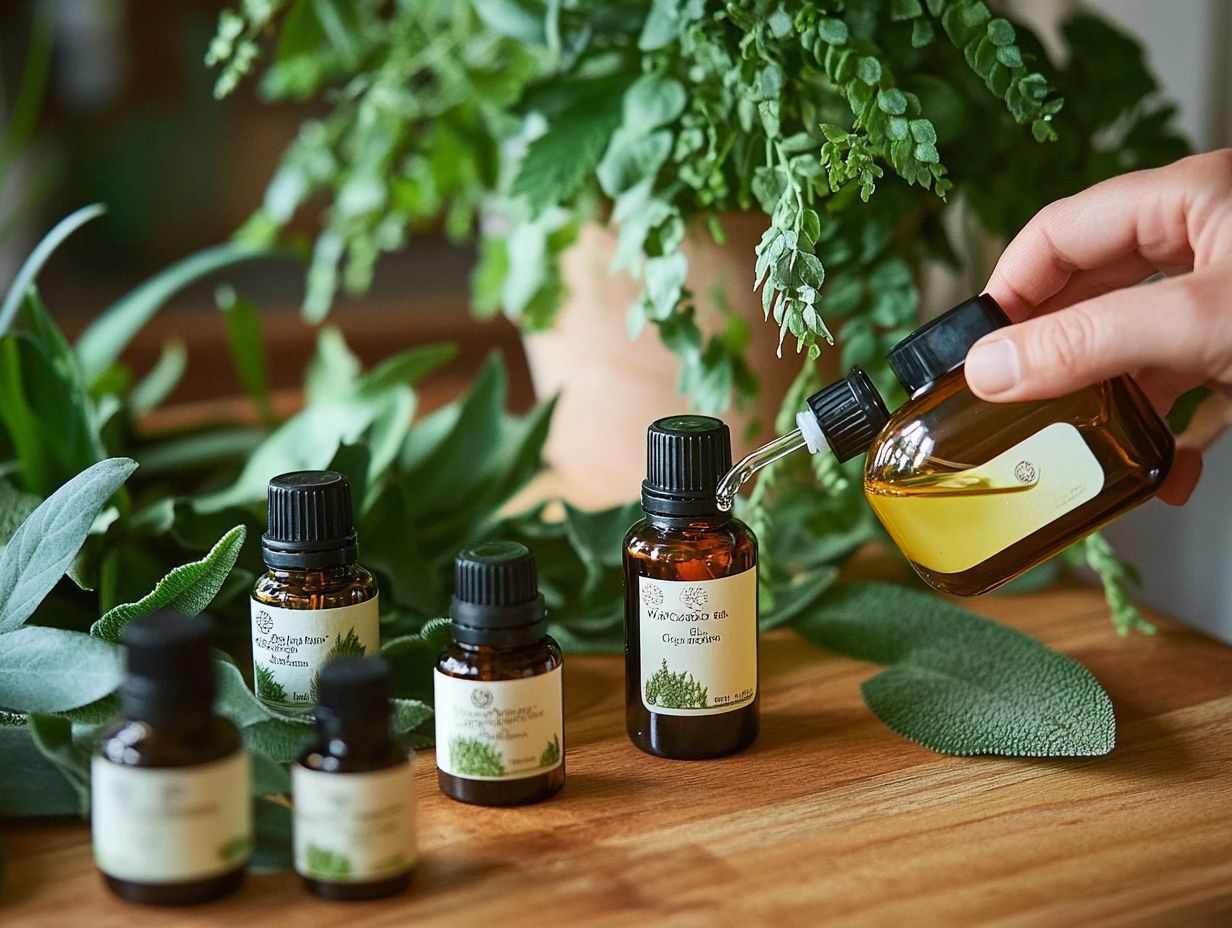
Ants can quickly become unwelcome guests, especially when they raid your kitchen in search of a snack. Peppermint essential oil is an effective remedy for deterring these little invaders. Its strong scent disrupts their pheromone trails, making it a natural ally in your pest control efforts.
To create a simple natural insect repellent spray, mix 10-15 drops of peppermint essential oil with a cup of water in a spray bottle. Shake well before using. Focus on areas where ants frequent such as entry points, baseboards, and countertops. Remember to reapply the spray regularly, especially after cleaning, since the scent can fade.
Boost your defense by mixing peppermint oil with vinegar or dish soap to craft an effective DIY bug spray! This combination not only repels ants but also leaves your home smelling fresh and delightful.
Mosquitoes
Mosquitoes are the unwelcome guests of summer, notorious for their annoying bites and ability to spread diseases. To combat these pesky intruders, use essential oils like citronella and lavender oil. These powerful natural insect repellents can keep mosquitoes at bay.
Incorporating these oils into homemade insect repellent sprays or diffusers allows you to reclaim your outdoor spaces, enjoying balmy summer evenings without the dread of mosquito bites.
Citronella, eucalyptus, and peppermint oils also effectively repel insects. For a quick DIY solution, mix these oils with a carrier like witch hazel or coconut oil for a soothing application that is safe for children.
Alternatively, diffusing these essential oils outdoors creates an aromatic barrier, deterring mosquitoes while infusing the air with a delightful fragrance.
Mastering the right proportions and methods can transform your summer experience, ensuring a mosquito-free haven as you enjoy the season’s beauty.
Get started on making your natural insect repellent today to enjoy a pest-free home!
Flies
Flies invade homes and outdoor spaces. They create disturbances and can spread bacteria. Essential oils can help.
Eucalyptus oil is renowned for its insecticidal properties. It acts as a natural bug repellent, effectively keeping flies at bay. This makes it a staple in many bug repellent recipes.
By incorporating eucalyptus into your DIY insect spray recipes or using it in diffusers, you can create a fragrant barrier. This helps maintain a fly-free environment.
Beyond its delightful scent, eucalyptus oil contains potent compounds like citronellal and 1,8-cineole. These compounds are particularly effective against bothersome insects, showcasing its insecticidal activity.
To craft your own fly-repelling spray, mix a few drops of eucalyptus oil with water and a splash of vinegar in a spray bottle. This ensures an all-natural solution. Give it a good shake before use and apply it in areas where flies tend to gather.
For an elegant touch, add eucalyptus oil to potpourri or candles. This provides both a natural repellent and a refreshing aroma for your living space. Regularly applying these homemade solutions significantly boosts their effectiveness.
Spiders
Spiders can be unwelcome guests in your home. Although they help control pests, it s best to keep them outside.
Essential oils like basil and tea tree oil come to the rescue. They have remarkable insecticidal properties that keep spiders from spinning webs indoors.
By crafting your own natural repellent sprays using these oils, you can manage spider populations effectively without harmful chemicals.
Embracing the benefits of these essential oils lets you create solutions that deter spiders and infuse your home with delightful fragrances.
To whip up a basil-based repellent, mix a few drops of basil oil with water in a spray bottle. Apply this straightforward concoction around doorways and windowsills for a proactive approach.
Likewise, combine tea tree oil with water for another efficient barrier against these eight-legged intruders. For the best results, focus on areas where spiders like to hang out, such as corners and dark spaces.
Remember to reapply your spray every few days or after cleaning to ensure it remains effective.
How to Use Essential Oils for Pest Control
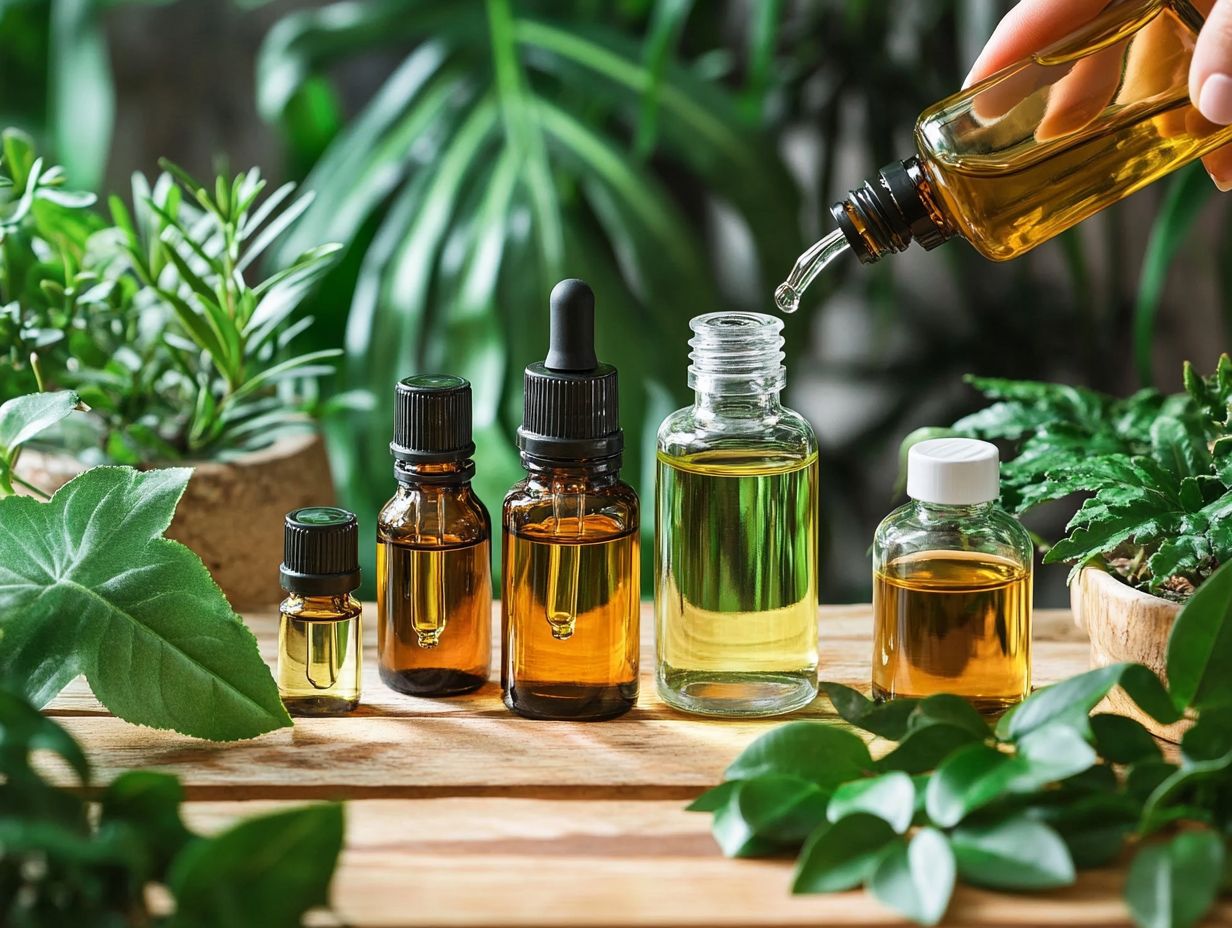
Utilizing essential oils for pest control can be a straightforward and effective endeavor. Craft your own homemade solutions like DIY bug spray that incorporate the benefits of essential oils.
By choosing essential oils known for their insecticidal properties, you can create natural insect repellent sprays that are both potent and safe for children and pets.
Your application methods can vary from spraying directly onto surfaces to diffusing oils in the air. This flexibility enhances your pest management strategies.
This approach provides the dual benefit of delightful aromas and effective insect deterrence, ensuring a pleasant yet pest-free environment.
DIY Recipes and Application Methods
Creating DIY pest control recipes with essential oils allows you to tailor your natural insect repellent solutions to your unique preferences and specific pest challenges. By blending oils like lavender, peppermint, and eucalyptus, you can amplify their insecticidal properties while enjoying delightful fragrances.
You have various application methods at your disposal spritzing with spray bottles, utilizing diffusers, or incorporating oils into your cleaning regimen all aimed at fostering a pest-free haven with the help of nature s best ingredients.
To craft a powerful spray, mix equal parts of distilled water and witch hazel with a few drops of your chosen essential oils. This mixture effectively targets pests without the use of harsh chemicals. If you seek stronger protection, feel free to experiment with the ratios to adjust the concentration of oils to suit your specific needs.
Incorporating these mixtures into your daily routine like spraying around doorways or windows creates a barrier against pesky insects, ensuring a more comfortable living environment. Using these oils in your household cleaners not only elevates the fragrance but also provides an added layer of defense, seamlessly integrating pest control into your everyday life.
Safety Considerations when Using Essential Oils for Pest Control
While essential oils can be incredibly effective for pest control, prioritizing safety ensures a worry-free pest control experience. Following safety guidelines is key to avoiding skin irritation, especially when applying diluted oils directly to your skin or within your home.
Ensure all mixtures are safe for kids and pets. Familiarizing yourself with the botanical names and properties of each oil enables you to make informed decisions regarding their application and dosage.
Possible Risks and Precautions
Using essential oils for pest control has its perks, but it also comes with some potential risks, mainly concerning skin irritation and allergic reactions. Before applying any oils topically, conduct patch tests to ensure safety for both children and pets.
Certain oils may have contraindications, or situations where certain oils shouldn’t be used, for specific individuals or environments. Taking the time to research each oil’s properties and consulting a professional when needed is advisable to avoid adverse reactions.
Some essential oils can be toxic if ingested or misused. Following proper dilution guidelines, or mixing the oil with a carrier to make it safe for use, and using them in well-ventilated areas is essential to minimize the risk of respiratory irritation.
If you have pre-existing health conditions, are pregnant, or have sensitive skin, extra caution is warranted. Educating yourself about potential reactions and opting for only high-quality, therapeutic-grade oils can significantly reduce these risks.
By prioritizing safety and understanding how to responsibly harness the benefits of essential oils, you can achieve an effective pest control strategy while maintaining your well-being.
Frequently Asked Questions
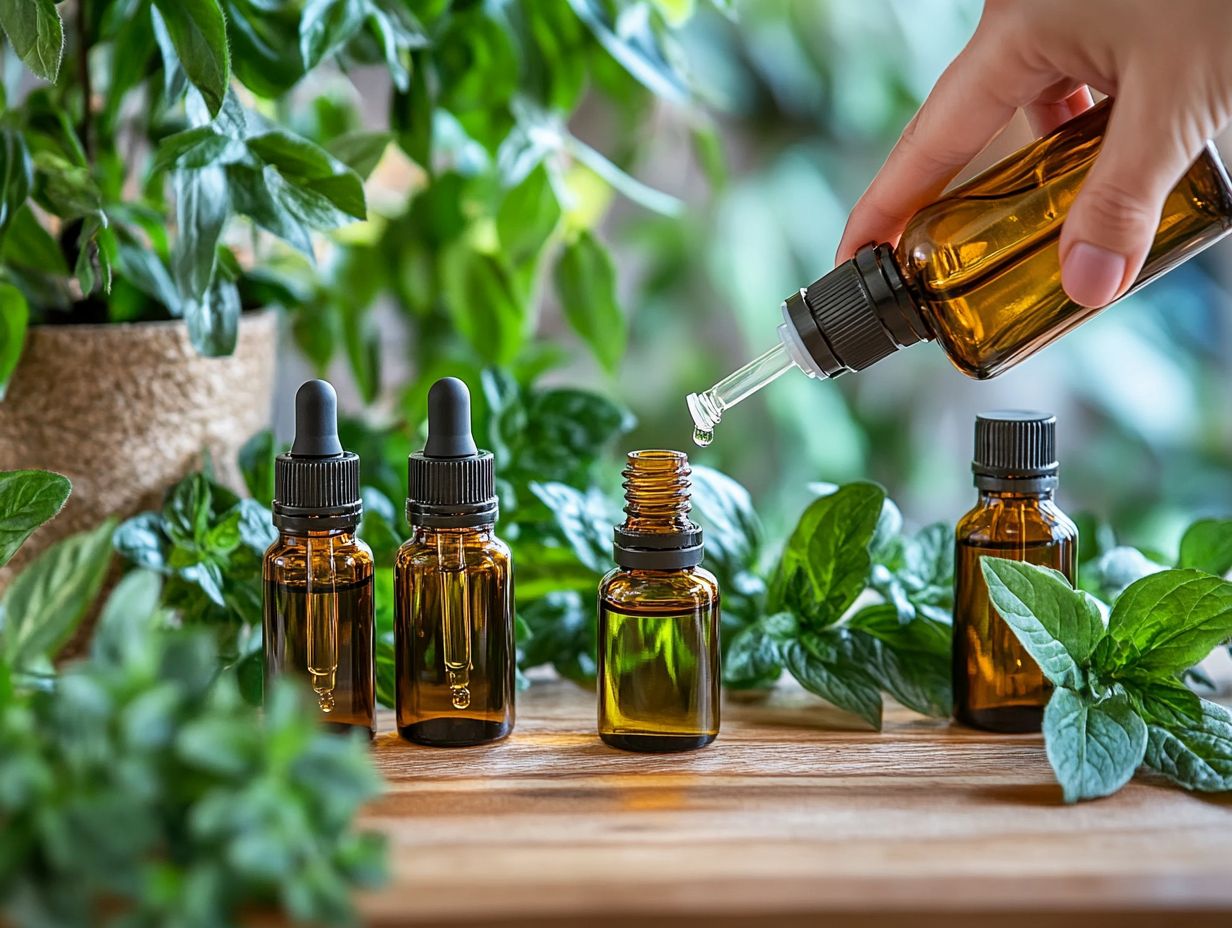
Discover How Essential Oils Can Deter Pests!
Essential oils are natural oils derived from plants through a distillation process. They contain potent compounds that repel pests and can be used as a non-toxic alternative to chemical pesticides.
Which essential oils are most effective in deterring pests?
Citronella, peppermint, clove, lavender, and lemongrass are some of the most effective essential oils for deterring pests. Each has its unique scent and properties that repel specific types of pests.
How do I use essential oils to deter pests?
Essential oils can be used in various ways to deter pests. Mix a few drops with water and spray it around your home, use it in diffusers, or apply it directly to areas where pests are likely to enter.
Are essential oils safe to use around children and pets?
Yes, essential oils are generally safe to use around children and pets as they are natural and non-toxic. However, it is always recommended to dilute the oils and keep them out of reach of children and pets.
How often do I need to reapply essential oils to deter pests?
Want to keep pests away? The effectiveness of essential oils varies. It depends on the type of oil and the pest. Reapply every few days to stay ahead!
Can essential oils completely eliminate pests?
Don t let pests take over your space! Essential oils can help deter them but may not get rid of them entirely. Combine oils with cleaning and sealing entry points for the best results!



